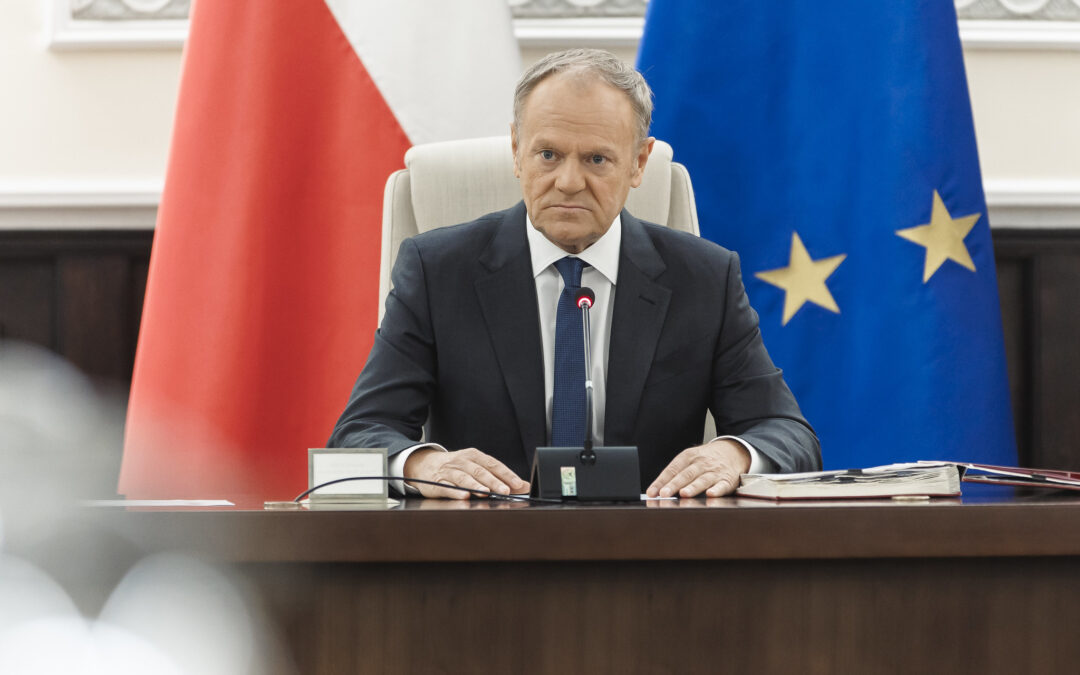The Left (Lewica), one of the groups in Poland’s ruling coalition, has announced that it will seek to abolish the right for individual member states to veto certain EU policies. It says the veto “gives tools to irresponsible politicians to destroy the union from within”.
Its proposal has been criticised by the right-wing opposition, which says removing the veto would further reduce Poland’s sovereignty and empower Brussels to impose policies on the country.
Przedstawiamy kolejny postulat Lewicy w wyborach do Parlamentu Europejskiego! 🔥
📣 @RobertBiedron: Będziemy walczyli o to, żeby znieść zasadę jednomyślności w Unii Europejskiej!#EuropaDlaCiebie pic.twitter.com/cuBV32BEFn
— Lewica (@__Lewica) May 3, 2024
The Left announced the policy ahead of next month’s elections to the European Parliament, in which it will be standing separately from its coalition partners, the centrist Civic Coalition (KO) and centre-right Third Way (Trzecia Droga).
It did so on 3 May, when Poland holds a public holiday to celebrate the anniversary of the adoption of the country’s constitution in 1791.
That document – which is regarded as Europe’s first modern constitution and the world’s second, after the US constitution – removed the right of single nobles to veto laws. Many historians see that prerogative, known as liberum veto, as one of the causes of the downfall of the Polish-Lithuanian Commonwealth.
Today Poland celebrates the historic May 3 Constitution of 1791, which gave rights to townsfolk, strengthened the king, and made Catholicism the "dominant religion". The last partitions made it a dead letter. I discuss the constitution in my latest podcast.https://t.co/5B6gcZ6GBD
— Stanley Bill (@StanleySBill) May 3, 2021
Robert Biedroń, one of the leaders of The Left, declared that “in Europe today a liberum veto is [also] in force”, allowing single member states to block policies.
This “has a destructive impact on Poland and the EU”, he claimed, saying it had in recent years enabled Hungarian Prime Minister Viktor Orbán to block defence aid to Ukraine and Poland’s former Prime Minister Mateusz Morawiecki to block EU plans to tax large corporations.
“The Left will seek to abolish the principle of the veto in the next term of the European Parliament and the European Commission,” said Biedroń, quoted by Polskie Radio. “It blocks the development of the EU by giving tools to irresponsible politicians to destroy the union from within.”
Poland will veto a new EU proposal to ensure that the rights of same-sex parents and their children are recognised in all member states, says the justice ministry https://t.co/dBNRe3qV08
— Notes from Poland 🇵🇱 (@notesfrompoland) December 9, 2022
EU rules currently require the unanimous agreement of member states on certain “sensitive matters”, such as common foreign and security policy, citizenship, EU membership, EU finances, and some aspects of tax policy, justice and home affairs, and social protection.
The Left wants this to be replaced by so-called qualified majority voting, which requires the support of 55% of member states representing 65% of the EU population.
The European Parliament adopted a resolution last November calling for the abolition of the veto principle and proposed a total of 267 changes to both the Treaty on the European Union and the Treaty on the Functioning of the European Union.
Poland’s two main parties – the national-conservative Law and Justice (PiS), which ruled until December last year and is now in opposition, and Civic Platform (PO), which is the main force in KO – declared their opposition to the proposed treaty changes.
Poland's main two parties, PiS and PO, have declared they will oppose proposed EU reforms in the European Parliament this week.
PO leader @donaldtusk today warned that the plans represent the kind of "naive euro-enthusiasm" that caused Brexit https://t.co/4SoNVxaSKQ
— Notes from Poland 🇵🇱 (@notesfrompoland) November 21, 2023
On Friday, The Left also proposed introducing a common constitution for the entire EU to guarantee the same rights for all the bloc’s citizens. It wants the constitution to include, among other things, provisions on defence policy and guarantees on the rights of women and minorities.
The document could be discussed in the upcoming term of the European Commission and the European Parliament and then adopted in an EU-wide referendum, Biedroń said.
Speaking alongside him, equality minister Katarzyna Kotula added that The Left would also like the European Parliament to be given the right to propose new laws, more budgetary powers, and “the possibility to appoint and dismiss the European Commission president in a constructive vote of no confidence.”
Poland has recorded the lowest level of support for the country’s presence in the EU in more than a decade, according to a new poll.
The score comes after years of record-high support for EU membership, often close to or exceeding 90% https://t.co/8gdBdyiQM0
— Notes from Poland 🇵🇱 (@notesfrompoland) April 29, 2024
The Left’s proposals have, however, been criticised by PiS and the far-right Confederation (Konfederacja), which see scraping the veto principle as a threat to Poland’s independence.
“Today, The Left has officially announced that it will hand over the right to decide Poland’s key issues to other states,” wrote PiS MP Piotr Müller on X. Ending veto rights would result in policies being introduced “by coercion, not cooperation”.
“The right of veto was not created to hinder the development of the union, but to block any harmful changes that hit the interests of smaller states,” said Ewa Zajączkowska-Hernik, Confederation’s spokeswoman, quoted by Radio Maryja. “[It] is a fundamental element of our sovereignty in the EU, which has a very authoritarian drive.”
UE ma wiele kompetencji, które są realizowane większością kwalifikowaną. Zwiększenie ich zakresu to ograniczanie praw Polski do współdecydowania o kluczowych kwestiach.
To próba wprowadzenia przymusu, nie współpracy. https://t.co/FYIcmJMHMr— Piotr Müller (@PiotrMuller) May 4, 2024
Last month, the foreign minister, Radosław Sikorski of PO, said in a parliamentary speech outlining the government’s foreign policy that Poland “will support realistic reform of the EU that will contribute to making it more powerful”.
“We are not convinced that treaty change is necessary for this, but we cannot exclude the possibility that some member states will make their agreement to complete enlargement conditional on it,” he added.
“We will then be faced with the dilemma of whether to agree to treaty reform…or to close the path to membership to our eastern and southern neighbours whose accession is beneficial to us,” continued Sikorski. In 2022, Ukraine and Moldova were formally granted accession candidate status.

Notes from Poland is run by a small editorial team and published by an independent, non-profit foundation that is funded through donations from our readers. We cannot do what we do without your support.
Main image credit: Klub Lewicy / flickr.com (public domain)

Alicja Ptak is deputy editor-in-chief of Notes from Poland and a multimedia journalist. She has written for Clean Energy Wire and The Times, and she hosts her own podcast, The Warsaw Wire, on Poland’s economy and energy sector. She previously worked for Reuters.



















